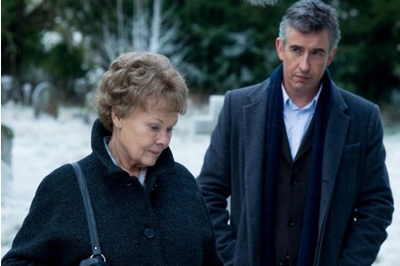Humour Cannot Hide Rage As Philomena Searches for Son
Herald Scotland
Dir: Stephen Frears With: Judi Dench, Steve Coogan, Sophie Kennedy Clark Runtime: 98 minutes SCOTS director Peter Mullan tackled the sins of the Magdalene laundries against those deemed "fallen women" in his searing 2002 drama, The Magdalene Sisters. Enraged and implacable, Mullan's film was a war cry from the heart. Stephen Frears's Philomena comes at the subject in a gentler fashion, even managing to leaven the sadness with laughter. What sacrilege is this, one might wonder? What way is this to treat the subject of young women torn from their sons and daughters? As it turns out, it is the best kind of irreverence, the kind that illuminates as it indicts, that takes no prisoners but does not go for the easy answers either. It is a difficult line to walk, and with anyone other than Judi Dench, Steve Coogan and Frears (The Queen, Dangerous Liaisons) it might have stumbled. While not without a misstep, Philomena links its arm into the audience's and chums them along the road. By the end, one would happily spend another hour in the company of the titular Philo-mena. Plus, and here is the clever part, one leaves the picture just as stirred as after Mullan's film. Philomena is based on the investigative book The Lost Child of Philomena Lee by Martin Sixsmith, a former BBC newsman turned Labour Government spin doctor turned ex-spin doctor. When the film opens, Sixsmith, played by Coogan (who also wrote the screenplay with Jeff Pope) has recently been unfairly "resigned" by his minister boss and is feeling rather sorry for himself, despite eventually winning the argument and a nice chunk of change in compensation. In another part of London an infinitely more serious miscarriage of natural justice is playing out. Philomena Lee (Dench) is marking the day with tears. This, she eventually tells her daughter, would have been the 50th birthday of the boy she had to give away after becoming pregnant out of wedlock as a teenager. Allowed to keep him for a few years while working in the laundry attached to a convent in Ireland, a rich couple arrived one day and took him away to start a new life. Philomena got on with her own life eventually, but never stopped grieving for, and feeling guilty about, the child she lost. When Philomena's daughter, a waitress, approaches Sixsmith at a party and suggests this might be a story he could take up, the journalist looks at her as if he has just been offered a glass of paraquat with a cherry on top. In the way that the Blair administration didn't "do" God, Sixsmith, a Russian and Washington expert, explains that he doesn't do human interest stories. Stories about weak-minded, vulnerable people read by weak-minded vulnerable people, he opines. So the screenplay sets up its opposing characters. The Oxbridge type who dines in "little places in Knightsbridge" near his home, and the homely Irish mammy who knows her way around a harvester. The faithless and the devout. The cynic and the optimist. It is a terrific dramatic pairing, and one Frears exploits mercilessly and delightfully. If the chalk and fine cheese idea is taken too far at times - would someone Philomena's age really marvel at chocolates on a hotel pillow? - one forgives the excess as the story races on. And what a rare tear of a tale it turns out to be as Frears ventures back and forth from Philomena's early days (when she is played by Scots actress Sophie Kennedy Clark in fine form) to the present day search for her son. Philomena is essentially a road trip movie, with the characters becoming more rounded as the milometer ticks on. Of the two, the Sixsmith character takes the greater knocks, with Coogan not afraid to make him seem a bit of a plonker at times. When he is taken to task, it is mostly Philomena doing the taking. She does not have things all her own way, though, changing her mind many a time about whether she wants the story aired. But we stick with the pair through thick, thin and the occasional skirt with cliche not only because the story is so compelling but because the characters are so engaging. We could no more abandon them in their 98 minutes of need than we would people we have known for years. Coogan is once again on remarkable form as a dramatic actor. At the start, courtesy of a line straight out of music hall, there is an iffy moment when one wonders if Alan Partridge is going to be in the picture too. Not to worry, though. There are laughs to be had in Philomena, but they are of the tender, tension-relieving variety. Faced with a choice whether to make the audience laugh, cry, or become incensed, Coogan and Pope's script, that first waver aside, does not put a foot wrong. Dench, as ever, makes everyone raise their game. It is the Oscar winner who sets the tone for a picture that is warm, forgiving, but underneath it all magnificently, quietly, enraged. Showing herself as adept at comedy-drama as she is at plain old drama, her Philomena is the mouse who roars.
|
.
Any original material on these pages is copyright © BishopAccountability.org 2004. Reproduce freely with attribution.
